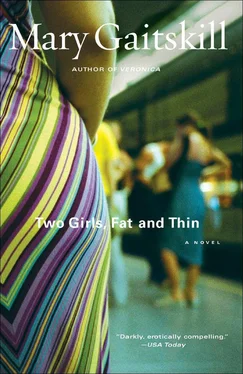Mary Gaitskill - Two Girls, Fat and Thin
Здесь есть возможность читать онлайн «Mary Gaitskill - Two Girls, Fat and Thin» весь текст электронной книги совершенно бесплатно (целиком полную версию без сокращений). В некоторых случаях можно слушать аудио, скачать через торрент в формате fb2 и присутствует краткое содержание. Год выпуска: 2012, Издательство: Simon & Schuster, Жанр: Современная проза, на английском языке. Описание произведения, (предисловие) а так же отзывы посетителей доступны на портале библиотеки ЛибКат.
- Название:Two Girls, Fat and Thin
- Автор:
- Издательство:Simon & Schuster
- Жанр:
- Год:2012
- ISBN:нет данных
- Рейтинг книги:5 / 5. Голосов: 1
-
Избранное:Добавить в избранное
- Отзывы:
-
Ваша оценка:
- 100
- 1
- 2
- 3
- 4
- 5
Two Girls, Fat and Thin: краткое содержание, описание и аннотация
Предлагаем к чтению аннотацию, описание, краткое содержание или предисловие (зависит от того, что написал сам автор книги «Two Girls, Fat and Thin»). Если вы не нашли необходимую информацию о книге — напишите в комментариях, мы постараемся отыскать её.
Review) create a haunting and unforgettable journey into the dark side of contemporary life and the deepest recesses of the soul.
Two Girls, Fat and Thin — читать онлайн бесплатно полную книгу (весь текст) целиком
Ниже представлен текст книги, разбитый по страницам. Система сохранения места последней прочитанной страницы, позволяет с удобством читать онлайн бесплатно книгу «Two Girls, Fat and Thin», без необходимости каждый раз заново искать на чём Вы остановились. Поставьте закладку, и сможете в любой момент перейти на страницу, на которой закончили чтение.
Интервал:
Закладка:
“Well,” he’d say, walking into the kitchen, “are you ready to loot Farmer Jack’s and A&P and Kroger’s for all the ice cream and Kleenex and chicken pot pie we can carry?”
Or my mother and I would take a walk after dinner, through blocks of identical houses, with identical shrubs planted in each yard, to a stretch of dirt road that led to a little cluster of stores, one of them a drugstore with an enormous fluorescent-lit candy counter. We’d buy Almond Joys, Mallomars, Mellomints, and licorice ropes and walk back in the dark as the street lamps winked on. Kids standing on the sidewalk in groups would stop talking and turn to watch us, their expressions dimmed by the evening.
When we got back to the house, my father would be sitting in the dark in the living room with a flashlight at his feet. We’d come in and he’d flick it on, shining it in our faces, momentarily blinding us. “Were they friendly at Baker Drugs?” he’d ask.
During these first weeks I saw very little of the other kids in the neighborhood because I almost never went out alone. They would sail by on bicycles, watching but keeping their distance whenever they saw us. Or I would hear them calling each other in a ritual singsong voice that scorned door bells and intermediary parents. The neighbors on either side of us (the old, grinning, big-nosed Sissels and the faded Catholic Kopeikins) had introduced themselves, but the Sissels had no children and the Kopeikins had only two squeamish myopic girls who wore matching flounce dresses, watched soap operas, and were given Saltines to eat when they were especially good.
One day when we’d been there almost a month, I was sitting in the front yard in a lawn chair reading Tarzan and the City of Gold when two boys pulled up on bikes and looked at me.
“Hey kid,” they said. “Where’re you from?”
“Cincinnati, Ohio.”
“Ohio’s a queer state.”
“What does ‘queer’ mean?”
“God!” They looked at each other in disbelief. “You don’t know what ‘queer’ means?”
I shook my head. Their voices were sarcastic, with a hard quality that didn’t allow for softness at all.
“It means retarded. Ohio’s a retard state.”
I felt my parents’ house behind me, and it felt vulnerable and weak. “Then what’s Michigan if Ohio’s a retard state?”
“Michigan’s a cool state. What’s your name, kid?”
“Dotty Footie.”
“God!” They looked at each other and rolled their eyes. “See you around, kid.” They got on their bikes and pedaled away.
I folded the lawn chair and went into the house. My mother was sitting on the hard new orange couch, reading a magazine, so I asked her what “queer” meant.
“It means odd, or unusual. Why?”
“Some boys came up while I was reading and said Ohio was a queer state.”
“That just means they don’t know much about Ohio.”
I didn’t go out and read again. But when I went with my parents for bargains or sight-seeing, I looked at the kids in the street more closely. I noticed that the boys and girls played separately, the boys standing in groups or walking with baseball equipment, the girls sitting on the concrete stoops with Barbie dolls, their blue plastic Barbie homes and accessories laid out in a format. I told myself that I was just the kind of person who liked to stay inside a lot.
“Territory is very important,” said my father. Somebody had thrown a paper cup on the edge of our yard, and he’d brought it in and put it on the kitchen table. “That’s why people have yards and fences and decorations and flowers in their yards. To establish a territory and mark it. Whatever bastard threw this on our yard has violated our territory, and if I see him do it again, I’ll kill him.”
Before the summer ended there was a serialized TV special on Anne Frank. We all sat in the basement and watched it in the dark, eating plates of cookies my mother made when The Wizard of Oz or something special was on. The Anne Frank show was a live play on a bare set of rooms with actors and actresses who had lines on their faces and pieces of hair hanging on their foreheads. It was preceded and followed by a man sitting in a chair talking about Nazis. They showed concentration camp footage at the end, as they were rolling the credits.
I loved the Anne Frank show. It made me feel something for other people, an awful connection with dead strangers more intimate than any relationship I had with my living peers. It made me feel vindicated and angry and self-righteous. The television presentation padded it enough so that it induced a mild feeling of sorrow and sensitivity instead of actual pain. After all, the actress who played Anne Frank had said in the end, “I believe people are basically good,” and the announcer had talked about the triumph of the human spirit, even though there were all those corpses.
In September I had to go to school. The trip to school was a gray sleepwalk through bathroom and breakfast, then through a neighborhood that was by now as familiar as a bad taste, surrounded by groups of other children who swung their lunch boxes and ferociously snapped their gum. In memory I see it from an aerial view; the square green lawns, the rooftops with the same chunk of space between them, the maze of sidewalks, the little human clusters progressing through the maze like disease moving through the body in a science diagram. The sight of myself — the lone toiling dot among the lunch box-swinging clusters — instantly recalls the fear and isolation that I took to be a normal state when among people other than my mother and father.
The school was a low concrete building surrounded by asphalt that had seesaws, swing sets and other iron instruments of play welded on to it. The halls were wide and monstrously echoed the shouts of children. We were assembled in the “Multi-Purpose Room,” given speeches, and told where to go. There were roughly thirty children assigned to big, full-skirted Miss Durrell, who had brown eyes and a burst of pimples arrayed across her forehead.
The days were defined by the tasks we had to accomplish such as making numbers jump over and under lines on the blackboard, reading about people on the Prairie, memorizing the imports and exports of Nicaragua, or why people in Turkey no longer had to wear fezzes. A map hung over the blackboard at all times to remind us that other countries were delineated by particular shapes and distinguished by different colors. At intervals we were made to go out on the asphalt where, for the most part, boys would run up and down screaming and fighting and girls would huddle by the door talking in low voices. The most formidable group was made up of big girls in short skirts that cut tight across their thighs and clung to their buttocks, who had hair that was teased and knotted until it stood straight up on their heads. I was afraid of them and I walked out to the edges of the playground and daydreamed until it was time to go in and memorize something else.
At the end of the day I would go home, strip off my dress and leave it on the floor of my room, put on pants, and go sit in the basement rec room watching Wagon Train, The Twilight Zone , and Hullabaloo until dinner was called.
During the first week I made friends with Eileen Iris, who sat next to me. She was a small, sedate child with long wavy brown hair who wore a pale pink sweater with white sequin leaves on it, which seemed the essence of femininity to me. Soon we were exchanging “friendship bracelets” made of fake shells, walking together on the outer reaches of the playground, collecting pretty pebbles, and eating the tiny strawberries to be found in the fitful undergrowth. She introduced me to tiny Darla Rice, a brown-skinned girl one grade younger than us whose short dark hair was set in a fashionable adult style. Her mother took the three of us to the wonderful Ice Capades in Detroit, to watch skaters in ballerina attire or grinning papier-mâché heads glide and leap to solemn recorded music as they were raked by mystic blue and white spotlights.
Читать дальшеИнтервал:
Закладка:
Похожие книги на «Two Girls, Fat and Thin»
Представляем Вашему вниманию похожие книги на «Two Girls, Fat and Thin» списком для выбора. Мы отобрали схожую по названию и смыслу литературу в надежде предоставить читателям больше вариантов отыскать новые, интересные, ещё непрочитанные произведения.
Обсуждение, отзывы о книге «Two Girls, Fat and Thin» и просто собственные мнения читателей. Оставьте ваши комментарии, напишите, что Вы думаете о произведении, его смысле или главных героях. Укажите что конкретно понравилось, а что нет, и почему Вы так считаете.












